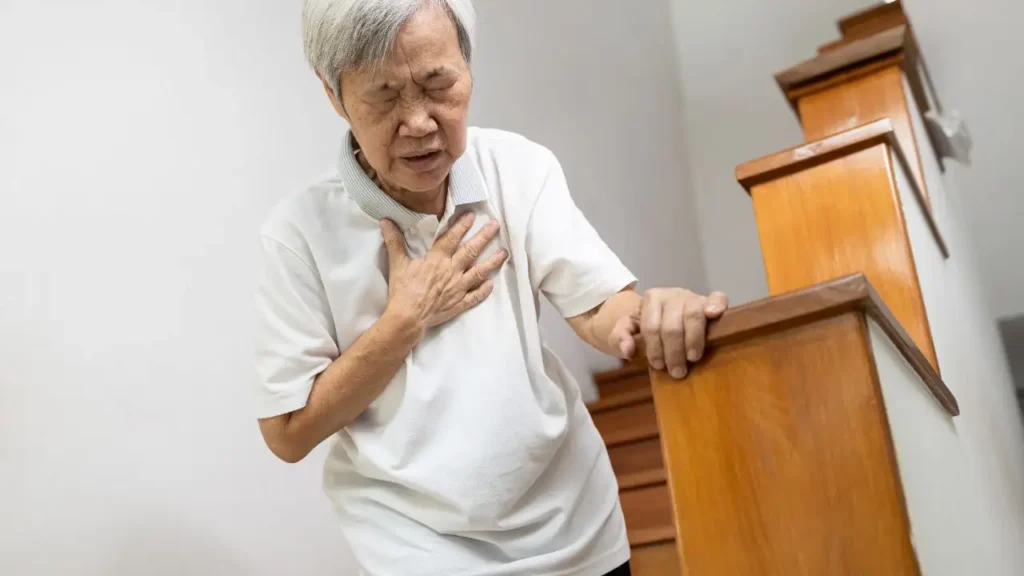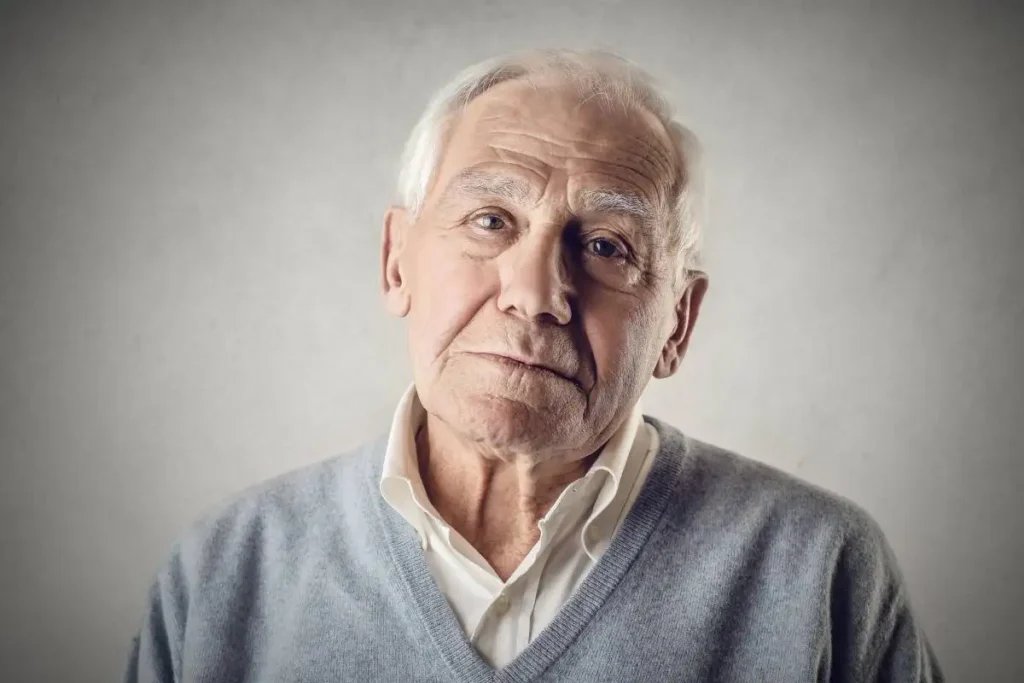Shortness of breath in Parkinson’s disease can sneak up on you. It’s like, one minute, you’re breathing just fine, and the next, it feels like you’ve run a marathon—without even moving! If you or someone you know has Parkinson’s, you might have noticed this struggle.
It’s actually more common than you might think, and there’s a bunch of reasons why it happens. In this post, I’ll take you through some of the key factors that could be causing that feeling of breathlessness.
And trust me, if you’ve been dealing with it, you’re not alone in this. I’ll also share some tips on how to deal with it because it can make everyday life a little more difficult than it needs to be.
Parkinson’s and Shortness of Breath
Parkinson’s disease messes with a lot of things—motor control, balance, and yeah, breathing too. There’s no sugar-coating it; the disease can affect how well your body controls a lot of automatic functions, like breathing.
Sounds kinda scary, right? Let’s break down exactly why shortness of breath happens in Parkinson’s and what might be triggering it.
1. Weakening Muscles
One of the first things Parkinson’s does is mess with your muscles. It doesn’t just affect the muscles you use to walk or move your arms. It also impacts the muscles that help you breathe.
If those muscles are weaker or stiffer, it makes it harder for your lungs to expand properly, which can leave you gasping for air.
If you’ve noticed that you get winded faster than you used to, that’s probably due to your diaphragm or other chest muscles not being able to do their job as well.
2. Changes in Breathing Patterns
Parkinson’s can mess with how your brain tells your body to breathe. I know that sounds a bit technical, but here’s the deal: your brain sends signals to control the rhythm and depth of your breathing.
With Parkinson’s, those signals can get all jumbled up. So, instead of breathing at a normal pace, you might end up breathing too quickly, too slowly, or feeling like you can’t catch your breath.
This is often referred to as “Parkinson’s Respiratory Dysfunction” (fancy, right?). It’s actually pretty common for Parkinson’s patients to struggle with shallow, rapid breathing without even realizing it.
3. Postural Problems
Parkinson’s also loves to mess with your posture. You know how, as Parkinson’s progresses, you might start to shuffle, lean forward, or feel rigid?
That can put pressure on your lungs and make it harder to take a deep breath. It’s like trying to suck in air while you’re hunched over a little too much. Not easy, right?
This constant postural shift can lead to a feeling of not getting enough air, even when you’re not doing anything strenuous. It’s the body’s way of saying, “Hey, I’m kinda stuck here.”
4. Medication Side Effects
Ah, the good ol’ meds. While they help with movement, sometimes Parkinson’s medications, like dopamine agonists or even levodopa, can have weird side effects.
Some of these side effects can mess with your breathing, making it either too shallow or causing you to feel winded.
If you think your meds are playing a role in your breathlessness, it’s always worth checking in with your doc to see if adjustments can be made.
5. Other Health Issues That Can Crop Up
When you have Parkinson’s, you’re more likely to develop other health issues that could impact your breathing. Think about things like:
- Sleep Apnea: Parkinson’s patients often deal with this, and it can make breathing feel shallow or difficult at night, which spills over into the day.
- Heart Disease: Having Parkinson’s also puts you at a higher risk for cardiovascular problems. If your heart isn’t pumping as effectively, it could contribute to feeling winded or out of breath.
- Lung Infections: Some people with Parkinson’s develop swallowing difficulties, which can lead to food or liquid accidentally entering the lungs. This increases the risk of infections, which can cause shortness of breath.
So yeah, it’s not always just Parkinson’s causing the issue, but a whole bunch of things that might be intertwined.
6. Stress and Anxiety
Here’s the thing: Parkinson’s isn’t just a physical battle. It’s also mental. And stress? Anxiety? Yeah, those can trigger shortness of breath too.
If you’re feeling anxious or overwhelmed (which, let’s be real, happens to the best of us), it can make you feel like you can’t breathe.
Parkinson’s patients often experience anxiety due to the challenges they face, which just adds another layer to the whole “I can’t catch my breath” thing.
How Does Shortness of Breath in Parkinson’s Affect Daily Life?
It’s easy to get frustrated when you can’t take a full, deep breath. The thing is, it doesn’t just impact exercise or strenuous activities—it affects everything. Here’s a quick breakdown of how this issue shows up in real life:
- Daily Tasks Become Harder: Tasks like climbing stairs, walking, or even talking for extended periods might leave you feeling like you can’t catch your breath.
- Sleep Problems: As I mentioned earlier, sleep apnea or just general difficulty breathing at night can affect how rested you feel. That lack of rest? It makes daytime breathing issues even worse.
- Reduced Exercise: Shortness of breath can limit your ability to exercise, which, in turn, impacts your overall health. Physical activity is important for Parkinson’s patients, but feeling winded often makes it harder to stay active.
What Can You Do About It?
You don’t just have to sit there and accept that breathlessness is part of Parkinson’s. There are things you can do to make it better—or at least more manageable. Here are a few options:
1. Breathing Exercises
Yep, simple breathing exercises can really help. You can try diaphragmatic breathing, which focuses on using your diaphragm to take deep breaths.
This can help you take in more air and feel less winded. Another technique is pursed-lip breathing, where you breathe in through your nose and exhale through pursed lips (like you’re blowing out a candle).
2. Posture Improvements
I know it’s easier said than done, but paying attention to your posture could make a big difference. Standing up straighter or working on your balance and flexibility can relieve some of the pressure on your lungs and make it easier to breathe. Occupational therapy can be really helpful here.
3. Stay Active
This one is huge. Even though shortness of breath might make you feel like you want to give up, staying active is actually one of the best ways to improve lung function.
Low-impact exercises, like walking or stretching, can help keep your lungs in better shape and prevent them from becoming weaker over time. It might take time, but consistency is key.
4. Talk to Your Doctor
It sounds basic, but seriously, if your shortness of breath is getting worse, don’t hesitate to bring it up with your doctor.
They can run tests to check for other conditions, tweak your meds, or even recommend specific therapies like physical or respiratory therapy to help manage the symptoms.
5. Address Anxiety
I get it—living with Parkinson’s is stressful, and anxiety can make breathing issues worse. If you’re feeling anxious, it’s worth looking into stress-relief techniques like meditation, yoga, or even talking to a therapist. Reducing anxiety can take some of that breathless edge off.
Wrapping It Up
So, if you’re feeling winded or like your breathing is off with Parkinson’s, it could be due to a bunch of different reasons. From muscle weakness to medication side effects, anxiety, and more—it all plays a part. The good news is, there are things you can do to help. Whether it’s through breathing exercises, posture adjustments, or talking to your doctor about treatment options, there are ways to make things easier.
Remember, you don’t have to just live with it. Start small, take things one day at a time, and don’t be afraid to reach out for help. Breathing better with Parkinson’s is totally possible!





